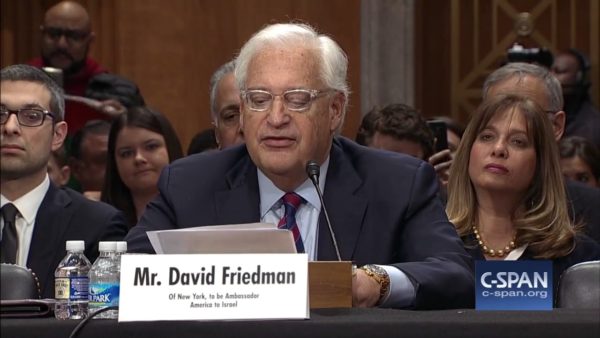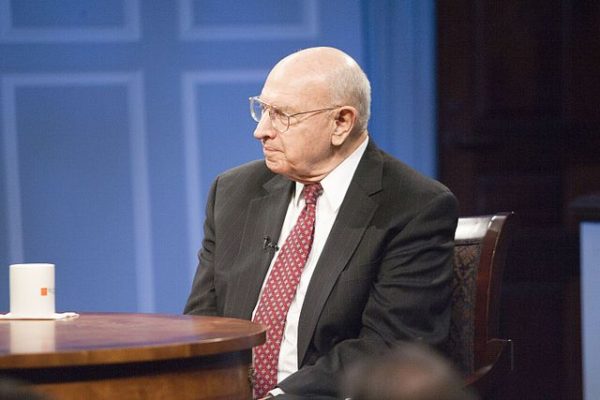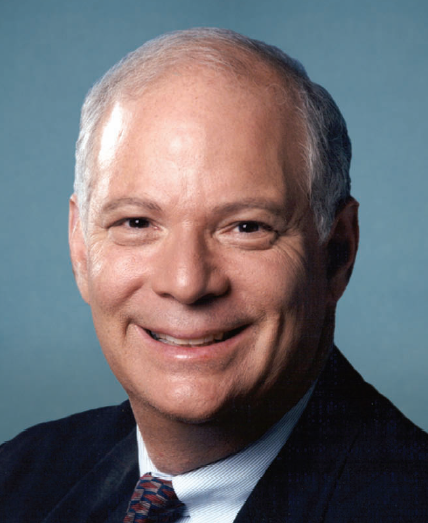David Friedman, President Donald Trump’s nominee to be U.S. ambassador to Israel, was on his best behavior on the first day of his confirmation hearing in the Senate a few days ago.
He apologized for his use of “inflammatory rhetoric” during the presidential campaign, acknowledged that Israeli settlements in the West Bank are not “a good thing for peace,” and described the two-state solution as “the best possibility for peace in the region.”

For a change, Friedman sounded reasonable rather than intemperate.
But how sincere was he?
Friedman, a bankruptcy lawyer who has worked for Trump and is associated with the far right in Israel, was well aware his nomination had caused a flutter of concern.
On February 16, just hours before was to appear before the Senate, five former U.S. ambassadors to Israel — Thomas Pickering, William Harrop, Edward Walker, Daniel Kurtzer and James Cunningham — sent a letter to its Foreign Relations Committee casting doubt on Friedman’s suitability.

Saying that Friedman has cast aspersions on the two-state solution, which is still the official policy of the United States despite Trump’s verbal meanderings, they noted he has been “active in supporting and financing the settler movement.”
Friedman’s nomination was also opposed by liberal Jewish organizations. Rabbi Rick Jacob, the president of the Union for Reform Judaism, described him as “the wrong person for this essential job at this critical time.”
Friedman, an Orthodox Jew who serves as president of American Friends of Beit El Institutions, a group that endorses Jewish settlement in the West Bank, was tapped for the position by Trump two months ago. Trump had nothing but praise for him, but Friedman was a problematic nominee from the moment his nomination was announced.
He likened supporters of J Street — a liberal pro-Israel lobbying organization based in Washington, D.C. — to “kapos.” Kapos were Jews in Nazi concentration camps who, under great duress, cooperated with their tormentors. Friedman’s comparison was grotesque, to say the least.
He accused Trump’s predecessor, Barack Obama, of antisemitism. This was a calumny of the first order. Obama, his critiques of Israeli policy in the West Bank notwithstanding, was supportive of Israel and was one of the most philosemitic presidents.
He insulted members of the Anti-Defamation League, calling them “morons.” This gratuitous insult was a telling commentary on Friedman’s judgment, given the fact that the Anti-Defamation League is an accomplished and respected organization.
He attacked Senator Charles Schumer of New York, claiming he had not done enough to oppose the Iran nuclear agreement, signed by the United States and five other major powers in the summer of 2015. According to Friedman, Schumer validated “the worst appeasement of terrorism since Munich.” What arrant nonsense! In the first place, Schumer opposed the deal. In the second place, the nuclear accord froze Iran’s nuclear program for about a decade, thereby serving the interests of Israel, as Israel’s top general has said, and of Sunni Arab countries like Saudi Arabia and Egypt.
All things considered, Friedman’s comments were ill-informed, insensitive and rude, the traits that no competent diplomat can afford to possess.
Realizing his chances of being confirmed might be hanging by a thread, Friedman launched a charm offensive in his first appearance before the Senate.

In response to a question from Senator Benjamin Cardin, who wondered whether he could act like a real ambassador, Friedman admitted he has spoken out of turn. “There is no excuse,” he said humbly. “These were hurtful words, and I deeply regret them. They’re not reflective of my nature or my character.”
On the face of it, Friedman’s straightforward acknowledgement of his glaring deficiencies is commendable. But I suspect his previous derogatory comments were in keeping with his actual views. And not for a moment do I believe he’s lost his ardor for Jewish settlements in the West Bank, or is suddenly in favour of a two-state solution.
These are mere words.
And there is another issue to consider, too. Friedman does not have a shred of diplomatic experience. The posting in Israel, one of the most important ones in the Middle East, requires the expertise and bearing of an impartial and seasoned professional who can best represent U.S. interests.
Lacking these essential qualities, Friedman is thus unfit to be America’s ambassador to Israel.